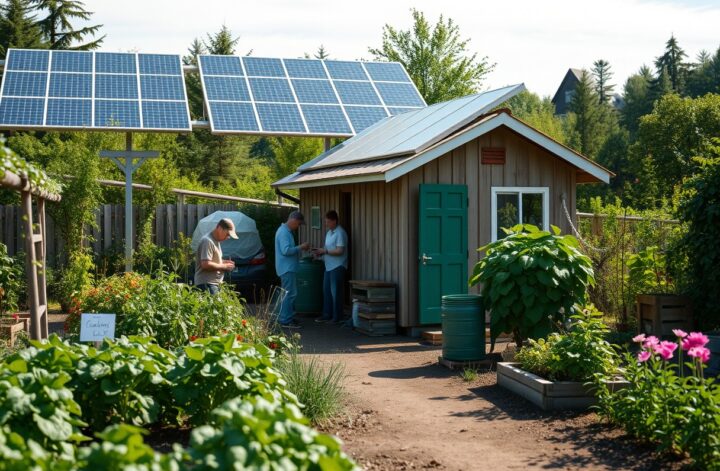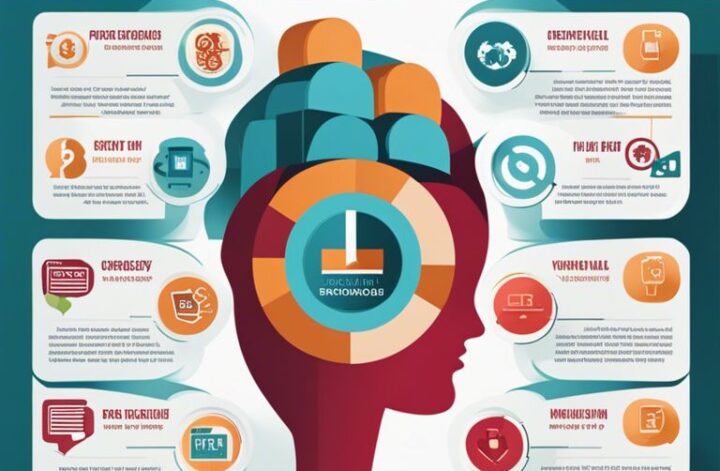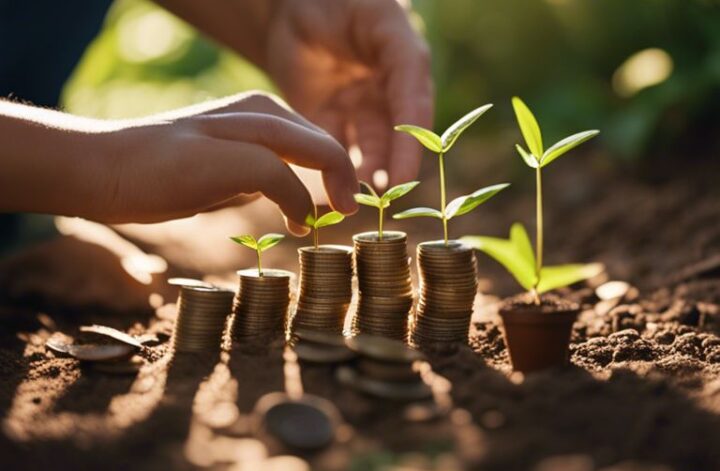Most individuals today seek financial independence while being mindful of their environmental impact. You can achieve both prosperity and sustainability by adopting practices that not only enhance your financial well-being but also contribute positively to the planet. This post will explore practical strategies for sustainable living, such as energy-efficient choices and mindful consumption, allowing you to align your financial goals with eco-friendly values. By integrating these approaches, you can pave the way for a future that supports your financial ambitions while nurturing the environment.
Key Takeaways:
- Sustainable Financial Independence: Achieving financial prosperity while minimizing environmental impact can create a harmonious balance between wealth and ecological responsibility.
- Energy-Efficient Living: Implementing energy-efficient practices not only reduces utility bills but also contributes to a slower depletion of natural resources.
- Frugality and Mindful Consumption: Adopting a frugal lifestyle encourages thoughtful purchasing decisions that prioritize sustainability, ultimately leading to reduced expenses and a healthier planet.
- Investing in Sustainable Companies: Channeling funds into eco-friendly businesses and sustainable investments, such as green bonds, supports environmental initiatives while enhancing financial growth.
- Supporting Local Eco-Friendly Businesses: By choosing to shop locally and invest in businesses that prioritize sustainability, individuals can contribute to their communities and create a lasting positive impact.

Understanding Financial Independence
The journey toward financial independence is a transformative process that empowers you to gain control over your finances and live life on your own terms. By achieving this state, you can secure not only your current needs but also your long-term goals, allowing you to prioritize both prosperity and sustainable practices.
Definition and Importance
Among the cornerstone concepts in personal finance, financial independence signifies the ability to support yourself without reliance on active employment. This independence is vital as it grants you the freedom to make choices that align with your values, such as adopting sustainable living practices that can ultimately enhance your quality of life.
Steps to Achieving Financial Independence
Steps to achieving financial independence involve assessing your current financial situation, setting clear goals, and crafting a strategic savings and investment plan. (Developing a budget that incorporates sustainable practices is vital.) By consciously tracking your expenses and increasing your savings rate, you can make informed decisions that contribute to both your financial and environmental objectives.
This process of achieving financial independence often includes shifting towards frugal living, which can drastically reduce expenses while aligning with eco-friendly practices. As you develop habits like mindful consumption and invest in sustainable companies, you’re not just building wealth—you’re contributing to a healthier planet. (Shifting your purchasing habits can create lasting financial benefits for you.)

The Principles of Sustainable Living
Clearly, the principles of sustainable living emphasize the importance of making choices that benefit both your financial health and the environment. By adopting practices such as energy-efficient living, waste reduction, and supporting eco-friendly businesses, you can align your lifestyle with your financial independence goals. These principles involve conscious decision-making that not only helps you save money but also contributes to a healthier planet, demonstrating that sustainability and prosperity can go hand in hand.
Key Concepts and Practices
On your journey towards sustainable living, it’s crucial to understand key concepts such as frugality and mindful consumption. These practices encourage you to prioritize quality over quantity in your purchases, leading you to invest in long-lasting, eco-friendly products. Additionally, by incorporating sustainable investment strategies like green bonds and socially responsible funds, you can actively support companies that align with your values, further enhancing both your financial health and environmental impact.
Benefits of Sustainable Living
Living sustainably offers numerous benefits, from significant cost savings to a more fulfilling and purposeful lifestyle. By reducing waste and embracing energy-efficient practices, you can see a direct decrease in your living expenses while also investing in your long-term financial future.
Even beyond financial savings, the lifestyle choices you make can lead to improved well-being and a sense of community. Engaging with local, eco-friendly businesses fosters connections with like-minded individuals, while investing in sustainable practices contributes to a healthier environment for future generations. The alignment of your financial goals with sustainable living not only enriches your life but also creates a positive ripple effect on the planet. This holistic approach can inspire others in your community to consider their choices, amplifying the impact of your efforts toward a more prosperous and sustainable future.
The Synergy Between Financial Independence and Sustainability
Unlike the traditional view that financial independence and sustainable living are mutually exclusive, they can effectively complement each other. By adopting eco-friendly practices, you not only contribute to a healthier planet but also enhance your financial well-being. This harmonious relationship emphasizes that achieving prosperity and minimal environmental impact is not just possible, but beneficial.
How Sustainability Reduces Expenses
One of the most immediate benefits of sustainability is the reduction in your daily living expenses. By opting for energy-efficient appliances and minimizing waste, you can significantly lower utility bills and other costs associated with consumption. (Making informed choices about energy use and consumption can lead to substantial savings over time.)
Long-term Financial Gains of Sustainable Practices
Reduces your financial liabilities in the long run by engaging in sustainable practices. Investing in renewable energy sources, for example, can lead to lower energy costs and stable returns in the coming years. Additionally, supporting local, eco-friendly businesses often means you’re backing enterprises that prioritize sustainability, which can enhance community wealth and create economic stability.
Also, aligning your investments with sustainable practices can yield considerable long-term returns. By choosing green bonds and socially responsible funds, you not only help promote environmental initiatives but also position yourself within a growing market that values sustainability. This approach not only secures your financial future but also contributes positively to the planet.
Energy-Efficient Living
Now is the perfect time to embrace energy-efficient living, a powerful strategy that supports both your financial independence and your commitment to sustainability. By optimizing your energy use, you not only lower your utility bills but also reduce your carbon footprint. Simple changes, like switching to energy-efficient appliances and incorporating smart home technology, can lead to significant savings and a more eco-friendly lifestyle.
Home Improvements and Upgrades
The right home improvements can dramatically enhance your energy efficiency. Investing in high-quality insulation, energy-efficient windows, and smart thermostats can reduce heating and cooling costs. These upgrades not only save you money in the long run but also boost the value of your home while contributing to a more sustainable living environment.
Renewable Energy Options
After making necessary upgrades, consider investing in renewable energy options for your home. Solar panels and wind turbines can significantly lower your reliance on fossil fuels while also providing long-term savings on your energy bills. By harnessing natural resources, you align your financial goals with eco-friendly practices.
Considering the benefits of renewable energy, you can transform your home into a sustainable haven. With solar panels, for example, you could save up to 70% on your electricity costs and potentially earn credits through net metering. Additionally, many states offer incentives for homeowners who invest in renewable sources, making it more affordable than ever. By choosing renewable energy, you not only enhance your financial independence but also take a significant step towards a greener planet.

Mindful Consumption and Waste Reduction
Despite the increasing consumerism in today’s society, you have the power to embrace mindful consumption that not only benefits your wallet but also the planet. By choosing to purchase only what you truly need and opting for quality over quantity, you can significantly reduce waste and align your spending with sustainable practices. This conscious approach can lead to long-term financial independence while simultaneously demonstrating responsibility to the environment.
Strategies for Reducing Waste
The key to reducing waste lies in simple strategies that you can incorporate into your daily life. Start by evaluating your consumption patterns – prioritize buying second-hand items, frequent local thrift stores, and support businesses that use minimal packaging. This not only cuts down on waste but also potentially saves you money in the long run. (Adopting these habits can profoundly impact both your financial goals and environmental footprint.)
The Frugal Lifestyle: Less is More
Against the backdrop of a throwaway culture, embracing a frugal lifestyle can be a powerful choice. By focusing on less consumption, you can cultivate a life rich in experiences rather than material possessions. This shift not only alleviates financial pressures but also fosters a deeper appreciation for what truly adds value to your life. (Opting for a frugal mindset can lead to more sustainable living choices that benefit both your financial health and the planet.)
Lifestyle changes toward frugality can create a pathway to sustainable living that resonates with your financial goals. By identifying and prioritizing what matters most to you, you can make intentional choices that reduce waste. Consider embracing DIY projects, repairing rather than replacing, and enjoying community experiences that don’t require heavy spending. (Choosing this path can ultimately enhance your life quality while supporting environmental sustainability.)
Investing in a Sustainable Future
After recognizing the importance of sustainable living, you can actively contribute to a better planet by investing in a sustainable future. You can explore strategies to achieve financial stability while making environmentally conscious choices. For insights on how to Achieve Late Career Sustainability and Financial Stability, consider sustainable investment options that align your financial goals with your values, promoting both prosperity and planetary health.
Sustainable Investment Options
On your journey to financial independence, consider various sustainable investment options such as green bonds and socially responsible funds. These investments not only provide the potential for financial returns but also support companies committed to eco-friendly practices, aligning your portfolio with your values.
Supporting Eco-Friendly Businesses
At the same time, you can make a significant impact by supporting eco-friendly businesses in your community. By choosing to shop from local, sustainable enterprises, you not only encourage ethical practices but also contribute to the economy’s growth. This approach helps reduce your carbon footprint while promoting a diverse marketplace focused on sustainability.
Indeed, by prioritizing eco-friendly businesses, you empower enterprises that invest in sustainable practices. These businesses often source materials responsibly, minimize waste, and support fair labor practices. Your purchasing decisions can influence the market, encouraging more companies to adopt sustainable practices, ultimately leading to a healthier environment and stronger local economies. By embracing this approach, you align your financial interests with your commitment to ecological conservation, fostering a lifestyle that supports both wealth and wellness.
Financial Independence and Sustainable Living – Balancing Prosperity and Planet
Following this guide, you can effectively balance financial independence with sustainable living. By adopting energy-efficient practices, minimizing waste, and investing in eco-friendly initiatives, you not only enhance your financial health but also contribute positively to the planet. Embracing frugality and mindful consumption enables you to achieve your financial goals while cultivating a sustainable lifestyle. Your choices today can pave the way for a prosperous and environmentally conscious future, benefiting both your wealth and the world around you.
FAQ
Q: What is the connection between financial independence and sustainable living?
A: Financial independence and sustainable living are interconnected in that both aim to create a healthier lifestyle and environment while promoting long-term stability. By adopting sustainable practices, individuals can lower their living expenses, such as energy costs, while simultaneously adding to their wealth through responsible investments. Living sustainably also encourages mindful consumption, which can lead to greater savings and less waste, contributing to overall financial well-being.
Q: What are some practical steps to achieve financial independence through sustainable living?
A: Individuals can pursue financial independence through sustainable living by implementing various strategies, such as:
- Investing in energy-efficient appliances to reduce utility bills.
- Practicing frugality by minimizing unnecessary purchases and focusing on high-quality, long-lasting items.
- Participating in community-supported agriculture (CSA) or local eco-friendly businesses to support sustainable practices while often receiving fresh, cost-effective produce.
- Educating oneself about eco-friendly investment options, such as green bonds and socially responsible funds, to grow wealth while supporting sustainable companies.
Q: How can reducing waste contribute to financial goals?
A: Reducing waste not only helps the environment but also significantly cuts down on personal spending. By adopting practices such as composting, recycling, and buying second-hand goods, individuals can lower their consumption of new products, which in turn minimizes expenses. Furthermore, reducing waste often fosters creativity and resourcefulness, allowing individuals to repurpose items and find cost-effective solutions in their lives.
Q: Can you provide examples of individuals who have successfully integrated financial independence with sustainable living?
A: Certainly! Many individuals exemplify this balance. For instance, one couple decreased their household expenses by downsizing to a smaller, more energy-efficient home while investing the savings into a diversified portfolio of sustainable investments. Another example is a single parent who turned to community gardening to provide fresh produce for their family while also reducing grocery costs. These stories highlight how lifestyle choices can align with both financial and ecological goals.
Q: What is the significance of supporting local, eco-friendly businesses?
A: Supporting local, eco-friendly businesses not only stimulates the local economy but also promotes sustainable practices within the community. When consumers choose to shop at local markets or stores that prioritize environmentally friendly methods, they contribute to reducing their carbon footprint associated with transportation and production. Additionally, this support helps strengthen the community and encourages more businesses to adopt sustainable practices, creating a positive feedback loop for both the environment and local financial health.




